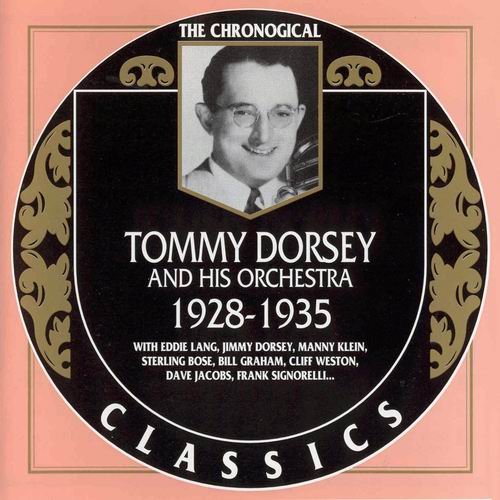Artist:
Tommy Dorsey And His Orchestra
Title:
The Chronological Classics- 1928-1935
Year Of Release:
1995
Label:
Classics[833]
Genre:
Jazz, Swing
Quality:
FLAC (tracks + .cue,log,scans)
Total Time: 76:02
Total Size: 250 MB(+3%)
WebSite:
Album Preview
Tracklist01. It's Right Here For You (3:11)
02. Tiger Rag (2:51)
03. Daddy, Change Your Mind (3:07)
04. You Can't Cheat A Cheater (2:59)
05. Three Moods (3:06)
06. Take Me Back To My Boots And Saddle (3:21)
07. Weary Blues (3:17)
08. Santa Claus Is Coming To Town (3:23)
09. You Are My Lucky Star (3:38)
10. I've Got A Feelin' You're Foolin' (2:30)
11. Got A Bran' New Suit (2:27)
12. On Treasure Island (3:28)
13. Now You've Got Me Doin' It (3:21)
14. I've Got A Note (2:45)
15. That's Not Cricket (3:08)
16. What A Wonderful World (3:17)
17. I'm Gettin' Sentimental Over You (3:38)
18. It's Written In The Stars (3:28)
19. One Umbrella For Two (3:34)
20. Two Hearts Carved On A Lonesome Pine (3:11)
21. Don't Give Up The Ship (3:00)
22. Alone (3:34)
23. At A Little Church Affair (2:24)
24. Pagan Star (3:23)
This is the first volume of the complete studio recordings of Tommy Dorsey as presented in the Classics Chronological Series. The first five tracks, relatively rare and gloriously instrumental, are worth the cost of the entire album. Four of these, recorded for the OKeh label in 1928 and 1929, feature "Tom Dorsey" playing the trumpet in the company of guitarist Eddie Lang with drummer Stan King and either tubaist/string bassist Jimmy Williams or pianist Frank Signorelli. The opening selection, an intimate rendering of Perry Bradford's "It's Right Here for You," has a lovely harmonium accompaniment by Arthur Schutt that mingles marvelously with Lang's reflective improvisations. Dorsey's expressive trumpeting pleasantly reflects the influence of Louis Armstrong and Bix Beiderbecke. His next opportunity to record under his own name occurred on Bastille Day in July of 1932. Billed now as "Tommy Dorsey," he presented his own composition, "Three Moods." Backed by a seven-piece "orchestra" that included brother Jimmy Dorsey, trumpeter Manny Klein, and Larry Binyon on tenor sax, the trombonist established a waltz and transformed it into a gavotte and then a swinging foxtrot. Beginning on September 26, 1935, Dorsey, billed for one last time as "Tom," made his first recordings as a leader for the Victor label. The three tunes waxed on that day represent in miniature an accurate condensation of Dorsey's stylistic output over the next few years: an innocent topical pop tune (in this case a rather glib cowboy reverie), a solidly swung traditional jazz stomp (here typified by Artie Matthews' "Weary Blues"), and the occasional dreaded blob of musical cotton candy (epitomized by "Santa Claus Is Coming to Town"). Anyone listening through the Tommy Dorsey chronology must contend with pop vocals and sidestep periodic outbursts of brain-numbing corn in order to locate and savor the pockets of real jazz that occur from time to time. If Eddie Condon were alive today he would counsel the truly jazz-inclined to listen for the second-chair trumpeting of Sterling Bose whenever the singers run out of lyrics. Two big-band instrumentals, "I'm Getting Sentimental Over You" and "Pagan Star," decisively established the Tommy Dorsey sound and provided the public with highly polished background music for all occasions. Several wonderful performances feature the tap dancing of Eleanor Powell, who sounds like she's been cross-dressing as she cheerfully spouts the lyrics to "Got a Bran' New Suit," makes an ass of herself speaking in a fake British accent during "That's Not Cricket," and redeems her dignity to some extent by hoofing her way through "What a Wonderful World." This vintage love song by Arthur Schwartz should not be confused with Bob Thiele's famous philosophical feel-good soliloquy sung by Louis Armstrong near the end of his life.
Exact Audio Copy V1.0 beta 3 from 29. August 2011
EAC extraction logfile from 9. April 2014, 18:46
Tommy Dorsey And His Orchestra / 1928-1935
Used drive : HL-DT-STDVDRAM GT20N Adapter: 2 ID: 0
Read mode : Secure
Utilize accurate stream : Yes
Defeat audio cache : Yes
Make use of C2 pointers : No
Read offset correction : 667
Overread into Lead-In and Lead-Out : No
Fill up missing offset samples with silence : Yes
Delete leading and trailing silent blocks : No
Null samples used in CRC calculations : Yes
Used interface : Native Win32 interface for Win NT & 2000
Gap handling : Appended to previous track
Used output format : User Defined Encoder
Selected bitrate : 1024 kBit/s
Quality : High
Add ID3 tag : No
Command line compressor : C:\Program Files (x86)\Exact Audio Copy\Flac\flac.exe
Additional command line options : -8 -V -T "ARTIST=%artist%" -T "TITLE=%title%" -T "ALBUM=%albumtitle%" -T "DATE=%year%" -T "TRACKNUMBER=%tracknr%" -T "GENRE=%genre%" -T "PERFORMER=%albuminterpret%" -T "COMPOSER=%composer%" %haslyrics%--tag-from-file=LYRICS="%lyricsfile%"%haslyrics% -T "ALBUMARTIST=%albumartist%" -T "DISCNUMBER=%cdnumber%" -T "TOTALDISCS=%totalcds%" -T "TOTALTRACKS=%numtracks%" -T "COMMENT=%comment%" %source% -o %dest%
TOC of the extracted CD
Track | Start | Length | Start sector | End sector
---------------------------------------------------------
1 | 0:00.32 | 3:11.35 | 32 | 14391
2 | 3:11.67 | 2:50.58 | 14392 | 27199
3 | 6:02.50 | 3:06.42 | 27200 | 41191
4 | 9:09.17 | 2:59.30 | 41192 | 54646
5 | 12:08.47 | 3:05.60 | 54647 | 68581
6 | 15:14.32 | 3:20.48 | 68582 | 83629
7 | 18:35.05 | 3:17.30 | 83630 | 98434
8 | 21:52.35 | 3:23.35 | 98435 | 113694
9 | 25:15.70 | 3:37.47 | 113695 | 130016
10 | 28:53.42 | 2:30.33 | 130017 | 141299
11 | 31:24.00 | 2:26.40 | 141300 | 152289
12 | 33:50.40 | 3:28.02 | 152290 | 167891
13 | 37:18.42 | 3:21.20 | 167892 | 182986
14 | 40:39.62 | 2:45.28 | 182987 | 195389
15 | 43:25.15 | 3:08.30 | 195390 | 209519
16 | 46:33.45 | 3:16.55 | 209520 | 224274
17 | 49:50.25 | 3:37.50 | 224275 | 240599
18 | 53:28.00 | 3:27.47 | 240600 | 256171
19 | 56:55.47 | 3:34.08 | 256172 | 272229
20 | 60:29.55 | 3:11.35 | 272230 | 286589
21 | 63:41.15 | 2:59.40 | 286590 | 300054
22 | 66:40.55 | 3:33.62 | 300055 | 316091
23 | 70:14.42 | 2:24.23 | 316092 | 326914
24 | 72:38.65 | 3:23.07 | 326915 | 342146
Track 1
Filename E:\01 - It's Right Here for You.wav
Pre-gap length 0:00:02.42
Peak level 88.2 %
Extraction speed 2.3 X
Track quality 100.0 %
Test CRC 5668FAA5
Copy CRC 5668FAA5
Accurately ripped (confidence 2) [BA879839] (AR v2)
Copy OK
Track 2
Filename E:\02 - Tiger Rag.wav
Pre-gap length 0:00:01.00
Peak level 74.2 %
Extraction speed 2.5 X
Track quality 100.0 %
Test CRC F67CD82F
Copy CRC F67CD82F
Accurately ripped (confidence 2) [1F287BB5] (AR v2)
Copy OK
Track 3
Filename E:\03 - Daddy, Change Your Mind.wav
Pre-gap length 0:00:01.00
Peak level 73.3 %
Extraction speed 1.7 X
Track quality 99.9 %
Test CRC 76E4A1ED
Copy CRC 76E4A1ED
Accurately ripped (confidence 2) [2FE06407] (AR v2)
Copy OK
Track 4
Filename E:\04 - You Can't Cheat a Cheater.wav
Pre-gap length 0:00:01.00
Peak level 68.6 %
Extraction speed 1.4 X
Track quality 100.0 %
Test CRC 43AF238D
Copy CRC 43AF238D
Accurately ripped (confidence 2) [66EDFA27] (AR v2)
Copy OK
Track 5
Filename E:\05 - Three Moods.wav
Pre-gap length 0:00:01.00
Peak level 75.3 %
Extraction speed 1.5 X
Track quality 100.0 %
Test CRC CA5DABD9
Copy CRC CA5DABD9
Accurately ripped (confidence 2) [0164FA0A] (AR v2)
Copy OK
Track 6
Filename E:\06 - Take Me Back to My Boots and Saddle.wav
Pre-gap length 0:00:01.00
Peak level 72.0 %
Extraction speed 1.6 X
Track quality 100.0 %
Test CRC 56652EDB
Copy CRC 56652EDB
Accurately ripped (confidence 2) [141969EE] (AR v2)
Copy OK
Track 7
Filename E:\07 - Weary Blues.wav
Pre-gap length 0:00:01.00
Peak level 74.6 %
Extraction speed 1.6 X
Track quality 100.0 %
Test CRC 279B55E2
Copy CRC 279B55E2
Accurately ripped (confidence 2) [6C16FD5B] (AR v2)
Copy OK
Track 8
Filename E:\08 - Santa Claus is Coming to Town.wav
Pre-gap length 0:00:01.00
Peak level 85.8 %
Extraction speed 1.7 X
Track quality 100.0 %
Test CRC 084A859B
Copy CRC 084A859B
Accurately ripped (confidence 2) [D8E9DFCC] (AR v2)
Copy OK
Track 9
Filename E:\09 - You Are My Lucky Star.wav
Pre-gap length 0:00:01.00
Peak level 76.1 %
Extraction speed 1.8 X
Track quality 100.0 %
Test CRC 15381D67
Copy CRC 15381D67
Accurately ripped (confidence 2) [289115B4] (AR v2)
Copy OK
Track 10
Filename E:\10 - I've Got a Feelin' You're Foolin'.wav
Pre-gap length 0:00:01.00
Peak level 78.3 %
Extraction speed 1.8 X
Track quality 100.0 %
Test CRC 3EAD2B90
Copy CRC 3EAD2B90
Accurately ripped (confidence 2) [327928F7] (AR v2)
Copy OK
Track 11
Filename E:\11 - Got a Bran' New Suit.wav
Pre-gap length 0:00:01.00
Peak level 81.2 %
Extraction speed 1.8 X
Track quality 100.0 %
Test CRC D377B717
Copy CRC D377B717
Accurately ripped (confidence 2) [7B8D3B8F] (AR v2)
Copy OK
Track 12
Filename E:\12 - On Treasure Island.wav
Pre-gap length 0:00:01.00
Peak level 59.8 %
Extraction speed 1.9 X
Track quality 100.0 %
Test CRC 73EA9A43
Copy CRC 73EA9A43
Accurately ripped (confidence 2) [636C7210] (AR v2)
Copy OK
Track 13
Filename E:\13 - Now You've Got Me Doin' It.wav
Pre-gap length 0:00:01.00
Peak level 66.5 %
Extraction speed 2.0 X
Track quality 100.0 %
Test CRC CEA6FF0C
Copy CRC CEA6FF0C
Accurately ripped (confidence 2) [00B41C04] (AR v2)
Copy OK
Track 14
Filename E:\14 - I've Got a Note.wav
Pre-gap length 0:00:01.00
Peak level 59.6 %
Extraction speed 2.0 X
Track quality 100.0 %
Test CRC FA496D96
Copy CRC FA496D96
Accurately ripped (confidence 2) [7581CF5C] (AR v2)
Copy OK
Track 15
Filename E:\15 - That's not Cricket.wav
Pre-gap length 0:00:01.00
Peak level 82.8 %
Extraction speed 2.1 X
Track quality 100.0 %
Test CRC 3522443E
Copy CRC 3522443E
Accurately ripped (confidence 2) [9BDC482A] (AR v2)
Copy OK
Track 16
Filename E:\16 - What a Wonderful World.wav
Pre-gap length 0:00:01.00
Peak level 84.0 %
Extraction speed 2.1 X
Track quality 100.0 %
Test CRC C7DDA437
Copy CRC C7DDA437
Accurately ripped (confidence 2) [F8831F56] (AR v2)
Copy OK
Track 17
Filename E:\17 - I'm Gettin' Sentimental Over You.wav
Pre-gap length 0:00:01.00
Peak level 68.1 %
Extraction speed 2.2 X
Track quality 100.0 %
Test CRC 48FA0F8E
Copy CRC 48FA0F8E
Accurately ripped (confidence 2) [815C72D1] (AR v2)
Copy OK
Track 18
Filename E:\18 - It's Written in the Stars.wav
Pre-gap length 0:00:01.00
Peak level 73.3 %
Extraction speed 2.3 X
Track quality 100.0 %
Test CRC E152CE64
Copy CRC E152CE64
Accurately ripped (confidence 2) [8C8A28D7] (AR v2)
Copy OK
Track 19
Filename E:\19 - One Umbrella for Two.wav
Pre-gap length 0:00:01.00
Peak level 75.5 %
Extraction speed 2.0 X
Track quality 99.9 %
Test CRC B683BBE9
Copy CRC B683BBE9
Accurately ripped (confidence 2) [005562F3] (AR v2)
Copy OK
Track 20
Filename E:\20 - Two Hearts Carved on a Lonesome Pine.wav
Pre-gap length 0:00:01.00
Peak level 72.4 %
Extraction speed 2.3 X
Track quality 100.0 %
Test CRC 45665448
Copy CRC 45665448
Accurately ripped (confidence 2) [06EAF341] (AR v2)
Copy OK
Track 21
Filename E:\21 - Don't Give Up the Ship.wav
Peak level 93.9 %
Extraction speed 2.4 X
Track quality 100.0 %
Test CRC 9991CD11
Copy CRC 9991CD11
Accurately ripped (confidence 2) [BFEF98C6] (AR v2)
Copy OK
Track 22
Filename E:\22 - Alone.wav
Pre-gap length 0:00:01.00
Peak level 75.6 %
Extraction speed 2.5 X
Track quality 100.0 %
Test CRC DF9E4445
Copy CRC DF9E4445
Accurately ripped (confidence 2) [394795E6] (AR v2)
Copy OK
Track 23
Filename E:\23 - At a Little Church Affair.wav
Peak level 75.2 %
Extraction speed 2.4 X
Track quality 100.0 %
Test CRC A4D3FF83
Copy CRC A4D3FF83
Accurately ripped (confidence 2) [EBAE04FF] (AR v2)
Copy OK
Track 24
Filename E:\24 - Pagan Star.wav
Pre-gap length 0:00:01.00
Peak level 68.2 %
Extraction speed 2.6 X
Track quality 100.0 %
Test CRC BFC1D1FB
Copy CRC BFC1D1FB
Accurately ripped (confidence 2) [5F373F07] (AR v2)
Copy OK
All tracks accurately ripped
No errors occurred
End of status report
==== Log checksum E5FFF237CD25629CAEC2C5E46C1CCF94EAB3B6FE6D46E76B58755E6691E86427 ====


![Sinedades - De par en par (2026) [Hi-Res] Sinedades - De par en par (2026) [Hi-Res]](https://img.israbox.com/img/2026-02/23/k9xyrl2p7m3kmcwozolhfnu7a.jpg)

![Acid Mothers Reynols, Acid Mothers Temple, Reynols - Vol. 3 (2024) [Hi-Res] Acid Mothers Reynols, Acid Mothers Temple, Reynols - Vol. 3 (2024) [Hi-Res]](https://img.israbox.com/img/2026-02/21/vgzin7mjpuc9xi8v2ce3z1jc8.jpg)



![Aaron Quinn - To Be Held (2026) [Hi-Res] Aaron Quinn - To Be Held (2026) [Hi-Res]](https://img.israbox.com/img/2026-02/20/zmwyd3pc4g0fv5hzoz5kht5h3.jpg)

